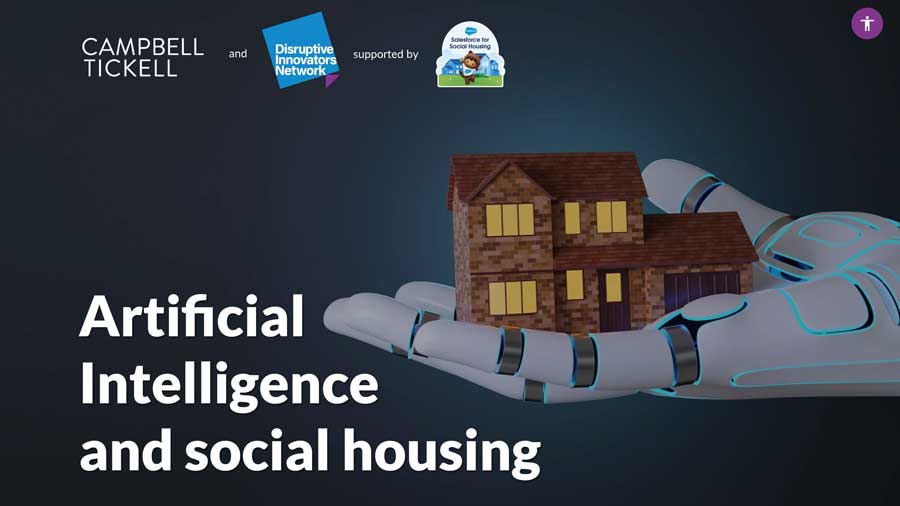Image: Istock
AI – potential benefits and pitfalls
At Campbell Tickell's recent webinar on AI, sector experts shared their insights on the technology

INNOVATION & IMPROVEMENT

James Tickell
Partner, Campbell Tickell

Zina Smith
Marketing and Communications Manager, Campbell Tickell
Issue 73 | September 2024
This article was partly generated using Microsoft Co-pilot, analysing the webinar transcript. It has been verified and edited by a human (Zina Smith).
The AI revolution is a monumental event in human history and we will see great change in the next decade. What will AI allow social housing organisations to achieve? What processes can be improved? And what will become possible?
At a recent Campbell Tickell webinar on AI in social housing, supported by Wheatley Group, industry experts attempted to answer these questions. Chaired by James Tickell, partner at Campbell Tickell, our guest speakers, Dr Haider Raza of the University of Essex, Jo Sedley-Burke of Campbell Tickell and Joanna Bouloux from Devonshires, shared their perspectives on the impact and integration of AI in the social housing sector. This article summarises some of their key discussions.
1. The strategic importance of AI
AI is not just a technological advancement but a strategic imperative for organisations. It needs to be considered at the board level, integrated into risk and opportunity registers and aligned with overall business strategies. The experts emphasised that AI’s potential to transform operations and enhance efficiency makes it a critical component of future planning.
2. Data quality and integrity
High-quality data is the backbone of effective AI implementation. The speakers highlighted the importance of ensuring data integrity and accuracy, as AI systems rely heavily on vast amounts of data to function optimally. Poor data quality can lead to ineffective AI solutions and even pose risks such as cyber attacks. Therefore, robust data management practices are essential.
3. Cybersecurity and confidentiality
With the increasing use of AI, the risk of cyber attacks also rises. Speakers stressed the need for strong cybersecurity measures to protect sensitive data. Additionally, they discussed the importance of maintaining confidentiality, especially when using AI tools that process large amounts of personal and organisational data. Clear guidelines and protocols are necessary to safeguard information.
“With the increasing use of AI, the risk of cyber attacks also rises.”
4. Collaboration and sector-wide solutions
AI’s benefits can be maximised through collaboration within the sector. The speakers suggested that housing associations and other organisations should work together to share insights, resources and best practices. This collaborative approach can help overcome common challenges and make AI more accessible.
5. Evolving skill sets
The integration of AI will inevitably change the skill sets required in various roles. Tasks that were once manual and routine will now require more analytical and decision-making abilities. Upskilling and reskilling staff to adapt to these new demands is crucial. Speakers highlighted the need for continuous learning and development to keep pace with technological advancements.
Watch the full webinar
6. Practical Applications of AI
Several practical applications of AI in the housing sector were discussed, showcasing its potential to improve efficiency and service delivery. These include:
- Damp and mould detection: AI can analyse images to identify and address issues proactively.
- Anti-social behaviour monitoring: Integrating data from various sources to monitor and manage behaviour.
- Predictive maintenance: Using data from sensors to predict and schedule maintenance needs.
- Tenant screening and allocation: Enhancing the process of matching tenants with suitable properties.
“Future spending on AI needs careful consideration.”
7. Investment
The financial implications of AI adoption were a significant theme. Large investments have already been made in existing systems, and future spending on AI needs careful consideration. The experts discussed whether AI will remain accessible only to large organisations or if sector-wide solutions can make it more affordable and effective for all.
1. The strategic importance of AI
AI is not just a technological advancement but a strategic imperative for organisations. It needs to be considered at the board level, integrated into risk and opportunity registers and aligned with overall business strategies. The experts emphasised that AI’s potential to transform operations and enhance efficiency makes it a critical component of future planning.
2. Data quality and integrity
High-quality data is the backbone of effective AI implementation. The speakers highlighted the importance of ensuring data integrity and accuracy, as AI systems rely heavily on vast amounts of data to function optimally. Poor data quality can lead to ineffective AI solutions and even pose risks such as cyber attacks. Therefore, robust data management practices are essential.
3. Cybersecurity and confidentiality
With the increasing use of AI, the risk of cyber attacks also rises. Speakers stressed the need for strong cybersecurity measures to protect sensitive data. Additionally, they discussed the importance of maintaining confidentiality, especially when using AI tools that process large amounts of personal and organisational data. Clear guidelines and protocols are necessary to safeguard information.
“With the increasing use of AI, the risk of cyber attacks also rises.”
4. Collaboration and sector-wide solutions
AI’s benefits can be maximised through collaboration within the sector. The speakers suggested that housing associations and other organisations should work together to share insights, resources and best practices. This collaborative approach can help overcome common challenges and make AI more accessible, even for smaller organisations.
5. Evolving skill sets
The integration of AI will inevitably change the skill sets required in various roles. Tasks that were once manual and routine will now require more analytical and decision-making abilities. Upskilling and reskilling staff to adapt to these new demands is crucial. Speakers highlighted the need for continuous learning and development to keep pace with technological advancements.
Watch the full webinar
6. Practical Applications of AI
Several practical applications of AI in the housing sector were discussed, showcasing its potential to improve efficiency and service delivery. These include:
- Damp and mould detection: AI can analyse images to identify and address issues proactively.
- Anti-social behaviour monitoring: Integrating data from various sources to monitor and manage behaviour.
- Predictive maintenance: Using data from sensors to predict and schedule maintenance needs.
- Tenant screening and allocation: Enhancing the process of matching tenants with suitable properties.
“Future spending on AI needs careful consideration.”
7. Investment
The financial implications of AI adoption were a significant theme. Large investments have already been made in existing systems, and future spending on AI needs careful consideration. The experts discussed whether AI will remain accessible only to large organisations or if sector-wide solutions can make it more affordable and effective for all.
Conclusion
The webinar highlighted the transformative potential of AI, in the social housing sector, as well as the potential risks associated. As AI continues to evolve, strategic planning and collaboration in the housing sector will be key to adaptation.

